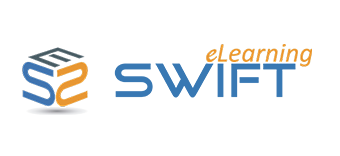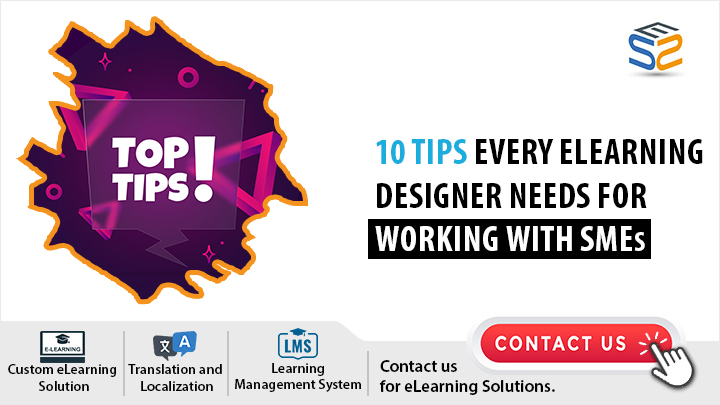10 Tips Every eLearning Designer Needs for Working with SMEs
Working with Subject Matter Experts (SMEs) is a critical aspect of eLearning design, as SMEs provide the content expertise that informs course development. Here’s what eLearning designers need to know when collaborating with SMEs:
1. Understand the SME’s Role
Content Experts: SMEs are experts in their field, not necessarily instructional design. Their major responsibility is to deliver accurate, timely content, insights, and context.
Collaborators: SMEs should be seen as partners in the course development process, helping to ensure that the information presented is correct and relevant.
2. Effective Communication is Key
Set Clear Expectations: Outline the roles, responsibilities, and timelines at the beginning of the project. This helps prevent misunderstandings.
Regular Check-ins: Establish regular communication channels to keep the project on track and ensure alignment on content and design.
Translate Technical Jargon: SMEs often speak in industry-specific language. Designers need to clarify and translate this into accessible content for learners.
3. Respect Their Time
Prepare in Advance: Before meetings or reviews, provide SMEs with clear guidelines on what feedback you need. This makes the process more efficient.
Streamline Reviews: Use templates or tools to make it easy for SMEs to provide feedback and edits. Minimizing their time investment is crucial.
4. Be Flexible and Patient
Accommodate Their Schedule: SMEs often have demanding roles, so flexibility in meeting times and deadlines is important.
Iterative Process: Be ready for several rounds of feedback. Content accuracy is paramount, so patience is necessary when refining the course.
5. Focus on Learner-Centered Design
Explain Instructional Design Concepts: SMEs can be unfamiliar with eLearning principles. Educate them on why certain design choices are made, focusing on how they benefit the learner.
Balance Content and Engagement: SMEs may want to include all available information. Guide them in prioritizing content that aligns with learning objectives while maintaining engagement.
6. Manage Content Scope
Avoid Content Overload: Work with SMEs to distinguish between “need-to-know” and “nice-to-know” information, ensuring that the course remains focused and effective.
Use the SME’s Expertise Wisely: Leverage the SME’s knowledge for the most critical aspects of the course, rather than trying to cover everything.
7. Foster a Positive Relationship
Build Trust: Show appreciation for the SME’s expertise and contributions. A positive, respectful relationship will facilitate smoother collaboration.
Seek Feedback: After the project, ask the SME for feedback on the process. This can help improve future collaborations.
8. Technical Proficiency
Familiarity with Tools: Some SMEs may be unfamiliar with eLearning tools or platforms. Providing them with a brief overview or training can help streamline the process.
Content Formats: Understand the best formats for content provided by SMEs (e.g., documents, videos, presentations) and guide them in delivering it in a usable form.
9. Documentation and Version Control
Track Changes: Keep a clear record of all content revisions and decisions made throughout the project. This is critical for regulating scope and maintaining consistency.
Centralized Repository: Use a central location for all project documents to avoid confusion and lost information.
10. Maintain Focus on Learning Objectives
Content Alignment: Always tie SME-provided content back to the course’s learning objectives. This ensures that the material is relevant and supports the desired outcomes.
By understanding these key aspects, eLearning designers can work effectively with SMEs to create impactful, accurate, and engaging courses.
Bonus Tip: Turning Challenging SMEs into Allies
When working with Subject Matter Experts (SMEs), eLearning designers need to understand that collaboration is the cornerstone of a successful project. Here is what they should remember.
- Build a Relationship: Establish trust and open communication from the start. Show genuine interest in their expertise and be transparent about the eLearning process. This mutual regard creates the foundation for a collaborative cooperation.
- Understand Their Perspective: SMEs are experts in their fields, not necessarily in instructional design. Be patient and explain the rationale behind design choices, ensuring they understand how their knowledge will be translated into effective learning experiences.
- Set Clear Expectations: Clearly define roles, responsibilities, and timelines. This helps to reduce misconceptions and keep the project on track. Regular check-ins can keep everyone aligned and address any concerns early on.
- Be Adaptable: Flexibility is key. Be open to feedback and willing to adjust your approach if an SME provides insights that could enhance the course. At the same time, gently guide them to prioritize the learner’s needs over excessive detail.
- Leverage Their Expertise: SMEs are invaluable when it comes to content accuracy. Encourage them to focus on what they know best-validating information, refining scenarios, and ensuring that the course content is both accurate and relevant.
- Provide Support: Not all SMEs are comfortable with the eLearning development process. Offer resources, templates, and examples to help them feel more at ease with tasks like reviewing storyboards or drafting quiz questions.
- Celebrate Small Wins: Recognize and appreciate the contributions of your SMEs throughout the project. Celebrating milestones and acknowledging their effort fosters a positive working relationship and motivates them to stay engaged.
By mastering these aspects of collaboration, eLearning designers can turn even the most challenging SMEs into strong allies, ensuring the success of their course development projects.




